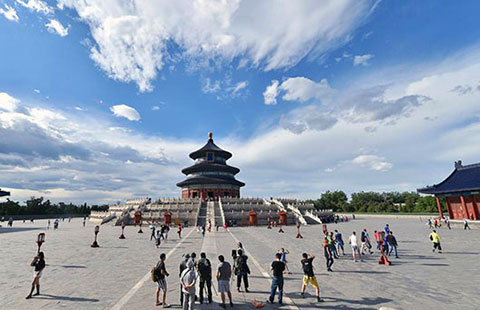Xi urges promoting economic, social development in Tibet
(Xinhua) Updated: 2015-08-25 23:38BEIJING - Chinese President Xi Jinping has asked for more efforts to promote economic growth and all-round social progress in Tibet and Tibetan-inhabited areas in four other provinces, vowing sustainable measures and continued preferential policies.
Tibet and Tibetan-inhabited areas in four other provinces have entered "a critical stage" toward fulfilling the country's goal of building a moderately prosperous society in a comprehensive way, Xi said at a two-day meeting on Tibet's future development, which ended on Tuesday.
Special financial, tax and investment policies should continue to be in place in the future in southwest China's Tibet autonomous region and Tibetan-inhabited areas in Sichuan, Yunnan, Gansu and Qinghai provinces, he added.
Development, which aims to improve living conditions for various ethnic groups and beef up social cohesion, should be advanced in a prudent and steady manner, and all measures taken should be sustainable, Xi said.
Xi urged bettering basic public service and adopting targeted measures to alleviate poverty, solve key problems which lead to poverty and improve living conditions for the impoverished as soon as possible.
"More active employment policies should be carried out to help residents of all ethnic groups to walk out of their farms and pastors to work in towns and companies and start businesses," he said.
Meanwhile, Xi said, efforts should also be made to incorporate education on "socialist core values" into courses in schools at various levels, popularize the national commonly-used language and script, and strive to foster "Party-loving and patriotic builders and successors of the socialist cause."
Addressing the same meeting, Premier Li Keqiang said that it is an arduous task for Tibet to build a "moderately prosperous" society over the next five years, together with other parts of the country.
The government should give top priority to improving people's livelihood, alleviating poverty and increasing employment among Tibetans, he noted, urging more efforts to boost education, medical care and social security in the region.
It is key for Tibet to sharpen its self-development capability through promoting its specialty industries, infrastructure construction, and environmental protection, said the premier.
"Efforts should be given to the development of agriculture and animal husbandry and related processing business, making Tibet an important tourism destination in the world, and promoting commerce and trade with South Asia to boost the Tibetan economy," he added.
Moreover, the building of local infrastructure should be sped up, including transportation networks, water conservation projects, power grids, among others, Li noted.
The Premier also pledged to increase financial aid and preferential policies to the ethnic minority area.
Yu Zhengsheng, chairman of the National Committee of the Chinese People's Political Consultative Conference, asked attendees to learn from the spirit of the meeting and work out effective measures to boost the development of Tibet.
Other members of the Standing Committee of the Political Bureau of the CPC Central Committee Zhang Dejiang, Liu Yunshan, Wang Qishan and Zhang Gaoli, also attended the meeting.
- Delegation salutes Tibet anniversary
- Officials are told to act as anti-graft watchdogs
- Great Wall safeguarded in united action
- Vice minister pledges more efforts to improve air quality
- Beijing’s efforts to control air pollution start to pay off
- China's military committed to reform
- Netizens rip singer over baby photos
- Central govt's growing support for Tibet
- Monument to be built on Tianjin blast site
- China and Russia seal raft of energy deals







